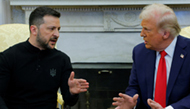▶ ROGER COHEN
The U.S. surveillance in question targeted the phone of Chancellor Angela Merkel. Or at least she was convinced enough of this to call President Obama, express outrage at a “serious breach of trust” and declare such conduct between allies “completely unacceptable.”The White House’s assurance to her that the United States “is not” and “will not” monitor her communications was tantamount to confirmation through omission that in the past it has.
Merkel is measured. For her to lift the phone and go public with her criticism leaves no doubt she is livid. As she said last July, “Not everything which is technically doable should be done.” This, on the now ample evidence provided by the former National Security Agency contractor Edward Snowden, is not the view of the N.S.A., whose dragnet eavesdropping has prompted fury from Paris to Brasília.
Obama, in his cool detachment, is not big on diplomacy through personal relations, but Merkel is as close to a trusted friend as he has in Europe. To infuriate her, and touch the most sensitive nerve of Stasi-marked Germans, amounts to sloppy bungling that hurts American soft power in lasting ways. Pivot to Asia was not supposed to mean leave all Europe peeved.
But all Europe is. The perception here is of a United States where security has trumped liberty, intelligence agencies run amok (vacuuming up data of friend and foe alike), and the once-admired “checks and balances” built into American governance and studied by European schoolchildren have become, at best, secret reviews of secret activities where opposing arguments get no hearing.
The disquiet of Snowden that turned him into a whistle-blower now encounters overwhelming sympathy. Impatience is high with statements from the Obama administration that surveillance is under review. A backlash could see Europe limit its sharing of financial and other data with the United States or impose heavy fines on American telecommunications companies that pass on European user details. The word “ally” is beginning to feel like a 20th-century idea that has lost its relevance.
None of this serves U.S. interests. Intelligence, counterterrorism and military cooperation with Germany and France, the two nations most outraged by recent disclosures, is critical. The relative power of the United States and Europe is declining, so cooperation is doubly important. Of course it will continue, but Obama faces a crisis of confidence in trans-Atlantic relations that vague promises about seeking the right balance between freedom and security will not allay. Merkel wants specifics; she is not alone.
Even before this furor, Germany was incensed by what it has perceived as a dismissive U.S. attitude. A senior official close to Merkel recently took me through the “very painful” saga of the Obama administration’s response to Syrian use of chemical weapons. It began with Susan Rice, the national security adviser, telling the Chancellery on Aug. 24 that the United States had the intelligence proving President Bashar al-Assad’s use of chemical weapons, that it would have to intervene and that it would be a matter of days. German pleas to wait for a United Nations report and to remember Iraq fell on deaf ears. Six days later, on Friday Aug. 30, Germany heard from France that the military strike on Syria was on and would happen that weekend — only for Obama to change tack the next day and say he would go to Congress.
Things got worse at the G-20 St. Petersburg summit meeting the next week. Again, Germany found the United States curtly dismissive. It wanted Germany’s signature at once on the joint statement on Syria; Germany wanted to wait a day until a joint European Union statement was ready and so declined. “The sense from Rice was that we are not interested in your view and not interested in the E.U. view,” the official said. “We left Petersburg very offended. This is not what you want your best partner to look like.”Germany found the atmosphere at the summit terrible. Vladimir Putin, the Russian president, insisted the Syrian opposition was behind the use of chemical weapons. He compared this to the Nazis burning of the Reichstag in 1933 in order to blame and crush their opponents (the fire’s origin is disputed). Putin, to the Germans, appeared much more powerful than Obama. His strengthened international standing after America’s Syrian back-and-forth worries a Germany focused on bringing East European nations like Ukraine and Moldova into association accords with the E.U. This European rapprochement is strongly resisted by Putin, who wants a Eurasian Union that bears an eerie likeness to the old Soviet Union.
Geopolitics on this continent is not dead. A re-pivot to Europe is in order, as is an internal U.S. security-freedom rebalancing. Handyüberwachung on Europe’s most powerful leader is the last thing America needs.
스마터리빙
more [ 건강]
[ 건강]이제 혈관 건강도 챙기자!
[현대해운]우리 눈에 보이지 않기 때문에 혈관 건강을 챙기는 것은 결코 쉽지 않은데요. 여러분은 혈관 건강을 유지하기 위해 어떤 노력을 하시나요?
 [ 건강]
[ 건강]내 몸이 건강해지는 과일궁합
 [ 라이프]
[ 라이프]벌레야 물럿거라! 천연 해충제 만들기
 [ 건강]
[ 건강]혈압 낮추는데 좋은 식품
[현대해운]혈관 건강은 주로 노화가 진행되면서 지켜야 할 문제라고 인식되어 왔습니다. 최근 생활 패턴과 식생활의 변화로 혈관의 노화 진행이 빨라지고
사람·사람들
more많이 본 기사
- 쿠팡 김범석, 30~31일(한국시간) 연석청문회 또 불출석 의사… “일정 있어”
- ‘6·3 大戰’ 앞둔 대통령실 참모들 시선집중…10여명 출마 거론
- 캐나다, 우크라에 18억달러대 추가 재정 지원키로
- ‘통일교 자금관리’ 한학자 前비서실장 재소환…피의자 전환
- 여야, ‘통일교·종합 특검’ 정면충돌 예고…연말연시 대치정국
- 뉴욕에 3년만에 최대 폭설…항공기 수천편 결항·지연
- 이이경·조세호 다 떠나고..유재석 곁엔 결국 ‘무도’ 인연이었다
- ‘파친코’ 이민진 작가 “맘다니 뉴욕시장, 긍정적 변화 기대”
- 180일간 김건희만 판 특검 오늘 수사 종료…’V0’ 단죄 성과
- 태국-캄보디아, ‘101명 사망’ 교전 20일만에 휴전
- 황하나, 남편 사망→캄보디아서 남친과 출산..귀국 후 구속 ‘파란만장’
- “트럼프, 29일 네타냐후 회담서 가자휴전 이행문제 제기키로”
- ‘이강달’ 강태오, 로코 달인은 다르다.. “김세정도 눈빛 좋다고”
- NASA 신임 국장 “美, 트럼프 임기내 달에 다시 갈것”
- “개인 선정은 SON이 유일?” 손흥민, 축구계 8대 기적 선정이 더 대단한 이유 “퀴라소 월드컵 진출보다 멋져”
- ‘AI 조작 번복’ 폭로자 vs ‘유재석 패싱’ 이이경..하차 잔혹사로 번진 사생활 논란 [2025 연말결산]
- 젤렌스키 미국행… “레드라인 있지만 타협점 찾을 수 있어”
- IS 확실했나…트럼프 ‘성탄절 나이지리아 폭격’ 갸우뚱
- 오윤아 “子, 학교 떨어져 잘못 키웠나..방치 했나 싶어 눈물”
- 마지막 토요일도 도심 집회… “내란 … 1
- [이지 사이언스] “온난화 막으려면 세계인구 44% 식단 바꿔야…문제는 소고기”
- LA 등 서부에 사흘째 폭우…동부엔 폭설 예보
- 韓정부, 노란봉투법 해석 지침 공개… 하청 임금·근로조건 좌우하면 ‘진짜 사장’
- 뉴욕시 폭설에 항공기 수천편 취소·지연 사태
- 러, 트럼프-젤렌스키 종전회담 직전 … 1
- “올해 최고 주목받은 테크 거물은 머스크 아닌 래리 엘리슨”
- ‘손흥민 감격의 첫 우승’ 올해 축구계 기적 톱8 선정 ‘선수로는 유일’
- 보수 야당 “의원직 사퇴하고 법심판 받아야”…김병기에 총공세
- 올해 美 기업 파산신청 증가… “관세·고물가·고금리 원인”
- ‘김건희에 로저비비에 선물’ 김기현 부인 특검 재출석…곧 기소
- 조지아 역주행 사고, 한인남편 이어 임신 아내도 사망
- “2025년 높이뛰기는 우상혁과 커의 무대” 세계육상연맹 조명... 우상혁도 “커와 계속 경쟁해야 해”
- 특검, 김건희 ‘금품 수수’ 무더기 기소… 뇌물 여부는 경찰 몫으로
- 새해 맞아 백만 달러 상금 증정 이벤트와 다양한 설 행사 선보여
- 우크라이나 포로수용소의 북한군인 동무들에게
- 트럼프 “소말릴란드 아는 사람 있나?”…이스라엘 승인에 ‘NO’
- 소싯적 ‘치기어린’ 주소 “굿바이”…지메일 주소변경기능 도입
- 국제은값 폭등에 개인투자자들 銀투자 대거 유입
- ICE 버지니아 구금시설 ‘포화’…수감자 역대최고
- “출생시민권은 사기”⋯ 이민 2세대 공격 초점 맞춘 트럼프
- 쿠팡 ‘정부 반박’ 영문성명 미묘한 표현차… ‘잘못된 비난’ 부각
- 찰스 3세, 내년 방미 추진…트럼프에 英왕실 ‘매력 공세’될까
- 새로운 콘포밍 론 한도
- 러, 젤렌스키 미국행 앞 대규모 공습…우크라도 러에 드론 공격
- VA·MD 7명 생굴 먹고 식중독…22개주 60여명 감염
- 린다 한 “내년 1월17일 별도 한인회연합회 만들겠다”
- 뉴욕·뉴저지 연말 대대적 음주운전 단속
- “올해 최고 주목받은 테크 거물은 머스크 아닌 래리 엘리슨”
- 특검, ‘로저비비에’ 김기현 부부 기소…尹 뇌물 수사는 경찰로
- “아동 수출국 오명 벗는다” 70년 만에 해외입양 중단
1/5지식톡

-
 미 육군 사관학교 West Poin…
0
미 육군 사관학교 West Poin…
0https://youtu.be/SxD8cEhNV6Q연락처:wpkapca@gmail.comJohn Choi: 714-716-6414West Point 합격증을 받으셨나요?미 육군사관학교 West Point 학부모 모…
-
 ☝️해외에서도 가능한 한국어 선생님…
0
☝️해외에서도 가능한 한국어 선생님…
0이 영상 하나면 충분합니다!♥️상담신청문의♥️☝️ 문의 폭주로 '선착순 상담'만 진행합니다.☎️ : 02-6213-9094✨카카오톡ID : @GOODEDU77 (@골뱅이 꼭 붙여주셔야합니다…
-
 테슬라 자동차 시트커버 장착
0
테슬라 자동차 시트커버 장착
0테슬라 시트커버, 사놓고 아직 못 씌우셨죠?장착이 생각보다 쉽지 않습니다.20년 경력 전문가에게 맡기세요 — 깔끔하고 딱 맞게 장착해드립니다!장착비용:앞좌석: $40뒷좌석: $60앞·뒷좌석 …
-
 식당용 부탄가스
0
식당용 부탄가스
0식당용 부탄가스 홀세일 합니다 로스앤젤레스 다운타운 픽업 가능 안녕 하세요?강아지 & 고양이 모든 애완동물 / 반려동물 식품 & 모든 애완동물/반려동물 관련 제품들 전문적으로 홀세일/취급하는 회사 입니다 100% …
-
 ACSL 국제 컴퓨터 과학 대회, …
0
ACSL 국제 컴퓨터 과학 대회, …
0웹사이트 : www.eduspot.co.kr 카카오톡 상담하기 : https://pf.kakao.com/_BEQWxb블로그 : https://blog.naver.com/eduspotmain안녕하세요, 에듀스팟입니다…
케이타운 1번가
오피니언

새해 더 중요해지는 노동법 준수

연말연시, 안전하고 차분하게
 캐슬린 파커 워싱턴포스트 칼럼니스트
캐슬린 파커 워싱턴포스트 칼럼니스트 [캐슬린 파커 칼럼] 지미 라이의 마지막 희망
 유경재 나성북부교회 담임목사
유경재 나성북부교회 담임목사 [한국춘추] 미국의 힘
 전병두 서북미수필가협회 회원
전병두 서북미수필가협회 회원 [금요단상] 비자 발급
 박일근 / 한국일보 수석논설위원
박일근 / 한국일보 수석논설위원 [지평선] 스님의 주례사
 신상철 / 고려대 고고미술사학과 교수
신상철 / 고려대 고고미술사학과 교수 [미술 다시보기] 신의 모습을 닮고자 한 예술가
 스티브 강 전 한인민주당협회 회장
스티브 강 전 한인민주당협회 회장 [스티브 강 ‘인사이드 미국’] 2026 중간선거: 트럼프 지지율 하락이 말해주는 것
 김홍일 케이유니콘인베스트먼트 대표
김홍일 케이유니콘인베스트먼트 대표 [기고] 안정의 기준은 어떻게 제도가 되었나
1/3지사별 뉴스

물류거점창고에 불체자 8만명 수용 추진
도널드 트럼프 행정부가 이민자 구금·추방을 효율화하기 위해 전국 물류거점 창고에 8만명 규모의 수용시설 확보를 추진한다고 24일 워싱턴 포스트…
‘학자금 상환’ 안하면 임금압류

“온 세상에 희망·평화의 빛 스며들길”
가자지구와 우크라이나에서의 전쟁, 고립과 불평등으로 세상이 어지러운 가운데 워싱턴 지역 각급 한인교회와 성당들이 성탄절을 맞아 일제히 예배와 …
“연말은 스트레스·새해 결심은 없다”

“올해 최고 주목받은 테크 거물은 머스크 아닌 래리 엘리슨”
올해 미국에서 가장 주목받은 기술업계 거물은 일론 머스크 테슬라 최고경영자(CEO)가 아닌 래리 엘리슨 오라클 창업자·회장이라고 블룸버그 통신…
[새해부터 이렇게 달라진다] 최저임금 또 오르고… 유급 병가는 더 확대

오늘 하루 이 창 열지 않음 닫기 





















































.png)


댓글 안에 당신의 성숙함도 담아 주세요.
'오늘의 한마디'는 기사에 대하여 자신의 생각을 말하고 남의 생각을 들으며 서로 다양한 의견을 나누는 공간입니다. 그러나 간혹 불건전한 내용을 올리시는 분들이 계셔서 건전한 인터넷문화 정착을 위해 아래와 같은 운영원칙을 적용합니다.
자체 모니터링을 통해 아래에 해당하는 내용이 포함된 댓글이 발견되면 예고없이 삭제 조치를 하겠습니다.
불건전한 댓글을 올리거나, 이름에 비속어 및 상대방의 불쾌감을 주는 단어를 사용, 유명인 또는 특정 일반인을 사칭하는 경우 이용에 대한 차단 제재를 받을 수 있습니다. 차단될 경우, 일주일간 댓글을 달수 없게 됩니다.
명예훼손, 개인정보 유출, 욕설 등 법률에 위반되는 댓글은 관계 법령에 의거 민형사상 처벌을 받을 수 있으니 이용에 주의를 부탁드립니다.
Close
x